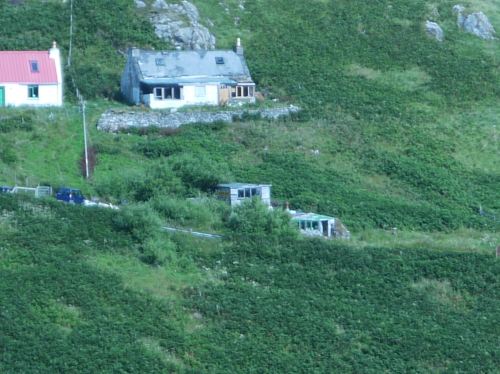The Move into Madness
Posted on
“Don’t come here because you don’t like it where you are. Come because you like it here.”
Once you decide to move to the Outer Hebrides, there’s no shortage of people telling you that you’re mad. They practically line up for the privilege. The reasons for this unhelpful diagnosis are many, and, for the most part, rooted in concern and affection. They range from It’s such a long way away, to How will you make a living? to Why are you running away?
Once you live here, you become fair game for anyone who doesn’t really know where the Outer Hebrides is but assumes it’s a rough-hewn, uncivilised place akin to Pictish Scotland somewhere around 800AD. So there are the inevitable jokes about whether or not we have electricity, whether or not we haul our water up from wells, whether or not the mail is delivered by puffin, whether or not we have to light hilltop bonfires to alert the appropriate people in an emergency, like the AA, how often we have to shin down sea cliffs to neck seagulls for our dinner, and how often we have to dust down our axes to fend off neighbouring tribes.
On a recent holiday to Norfolk, I and my young adult children were strolling through a Saturday market, the likes of which we don’t get on Lewis, and had our first sight of a star cauliflower. When I passed a remark within earshot of the stallholder, well, anyone would have thought I still believed the earth was flat – as, indeed, the Picts did in 800AD. While I bantered amiably enough about the electricity, the water, the mail, the telephone, and – a creative addition, this, from a market-garden man – whether or not we had come across daffodils before, my kids fumed at the impertinence of a total stranger taking the liberty of making fun of our home.

They were right, I suppose. The Outer Hebrides is a curious place for a mainlander to contemplate – removed as it is from cities and Starbucks, motorways, Marks & Spencer and Macdonalds. The received wisdom is that to leave all those treasures behind, you must be running away from something. The notion that your move might actually be a positive decision is greeted with bewilderment or derision.
But while this unique environment can be a real galvaniser for the people who get it, it is a paralyser for others. I can’t count the number of people we’ve seen arrive and leave within a couple of years. As befits this extreme location, responses to it are equally extreme – people either get it, and fall in love, or don’t get it, and leave. Are people running away – or looking for an alternative? Moving to the Outer Hebrides to solve your problems is akin to a couple considering divorce deciding to save their relationship by having a baby. Your problems tend to follow you, wherever you are.
So whether or not anyone is mad to move here depends on your viewpoint – and motive. You have to ask yourself what you want out of life, then you have to consider whether or not the Outer Hebrides has got what it takes to deliver.
The quote preceding this blog came from a man in a South Harris bar, in the course of a conversation about incomers and what we expect to find when we arrive. His point - that people are often disappointed when they discover that living here is not like living on the mainland – is such an obvious one that it’s easy to completely miss. We kept coming back to it in the course of our pre-move prep – were we moving simply because the mainland lifestyle didn’t suit us, or were we moving because the Outer Hebrides offered advantages that would help us live a life more amenable to our wants?
Part of the problem, of course, is that whatever you might imagine about what it’s going to be like to live here, is that you don’t really know until you pack the boxes and do it …
